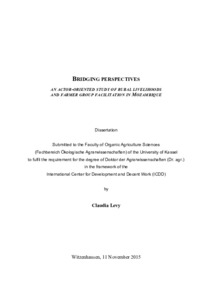| dc.date.accessioned | 2016-09-29T06:56:42Z | |
| dc.date.available | 2016-09-29T06:56:42Z | |
| dc.date.issued | 2016-09-29 | |
| dc.identifier.uri | urn:nbn:de:hebis:34-2016092950980 | |
| dc.identifier.uri | http://hdl.handle.net/123456789/2016092950980 | |
| dc.description.sponsorship | International Center for Development and Decent Work (ICDD); German Academic Exchange Service
(DAAD); German Ministry for Development Cooperation (BMZ); German Institute for Tropical and Subtropical Agriculture (DITSL); Mozambican
Ministry for Agriculture (IIAM); International Livestock Research Institute (ILRI) | eng |
| dc.language.iso | eng | |
| dc.rights | Urheberrechtlich geschützt | |
| dc.rights.uri | https://rightsstatements.org/page/InC/1.0/ | |
| dc.subject | Livelihoods | eng |
| dc.subject | Knowledge co-construction | eng |
| dc.subject | Mozambique | eng |
| dc.subject | farmer groups | eng |
| dc.subject | actor-oriented | eng |
| dc.subject.ddc | 300 | |
| dc.subject.ddc | 630 | |
| dc.title | Bridging Perspectives | eng |
| dc.type | Dissertation | |
| dcterms.abstract | People’s ability to change their social and economic circumstances may be constrained by various forms of social, cultural and political domination. Thus to consider a social actor’s particular lifeworld in which the research is embedded assists in the understanding of how and why different trajectories of change occur or are hindered and how those changes fundamentally affect livelihood opportunities and constraints. In seeking to fulfill this condition this thesis adopted an actor-oriented approach to the study of rural livelihoods. A comprehensive livelihoods study requires grasping how social reality is being historically constituted. That means to understand how the interaction of modes of production and symbolical reproduction produces the socio-space. Research is here integrated to action through the facilitation of farmer groups. The overall aim of the groups was to prompt agency, as essential conditions to build more resilient livelihoods.
The smallholder farmers in the Mabalane District of Mozambique are located in a remote semi-arid area. Their livelihoods customarily depend at least as much on livestock as on (mostly) rain-fed food crops. Increased climate variability exerts pressure on the already vulnerable production system. An extensive 10-month duration of participant observation divided into 3 periods of fieldwork structured the situated multi-method approach that drew on a set of interview categories. The actor-oriented appraisal of livelihoods worked in building a mutually shared definition of the situation. This reflection process was taken up by the facilitation of the farmer groups, one in Mabomo and one in Mungazi, which used an inquiry iteratively combining individual interviews and facilitated group meetings. Integration of action and reflection was fundamental for group constitution as spaces for communicative action. They needed to be self-organized and to achieve understanding intersubjectively, as well as to base action on cooperation and coordination. Results from this approach focus on how learning as collaboratively generated was enabled, or at times hindered, in (a) selecting meaningful options to test; (b) in developing mechanisms for group functioning; and (c) in learning from steering the testing of options.
The study of livelihoods looked at how the different assets composing livelihoods are intertwined and how the increased severity of dry spells is contributing to escalated food insecurity. The reorganization of the social space, as households moved from scattered homesteads to form settlements, further exerts pressure on the already scarce natural resource-based livelihoods. Moreover, this process disrupted a normative base substantiating the way that the use of resources is governed. Hence, actual livelihood strategies and response mechanisms turn to diversification through income-generating activities that further increase pressure on the resource-base in a rather unsustainable way. These response mechanisms are, for example, the increase in small-livestock keeping, which has easier conversion to cash, and charcoal production. The latter results in ever more precarious living and working conditions. In the majority of the cases such responses are short-term and reduce future opportunities in a downward spiral of continuously decreasing assets. Thus, by indicating the failure of institutions in the mediation of smallholders’ adaptive capabilities, the livelihood assessment in Mabomo and Mungazi sheds light on the complex underlying structure of present day social vulnerability, linking the macro-context to the actual situation. To assist in breaking this state of “subordination”, shaped by historical processes, weak institutions and food insecurity, the chosen approach to facilitation of farmer groups puts farmer knowledge at the center of an evolving process of intersubjective co-construction of knowledge towards emancipation. | eng |
| dcterms.accessRights | open access | |
| dcterms.alternative | An actor-oriented study of rural livelihoods and farmer group faclitation in Mozambique | eng |
| dcterms.creator | Levy, Claudia | |
| dc.contributor.corporatename | Kassel, Universität Kassel, Fachbereich Ökologische Agrarwissenschaften | |
| dc.contributor.referee | Knerr, Beatrice (Prof. Dr.) | |
| dc.contributor.referee | Webster, Edward (Prof. Dr.) | |
| dc.description.everything | This thesis was prepared within the interdisciplinary framework of the Graduate School of
Socio-Ecological Research for Development, through its International Center for
Development and Decent Work (ICDD). In practice this meant that the PhD research was cosupervised
by the Faculty for Organic Agriculture in Kassel/Witzenhausen, Germany and by
the Department of Sociology, University of the Witwatersrand, Johannesburg, South Africa. | eng |
| dc.subject.swd | Moçambique | ger |
| dc.subject.swd | Ländlicher Haushalt | ger |
| dc.date.examination | 2016-08-04 | |

